Sources
- Bertel Krarup: 'Syberg, Franz Adolf', Grove Music Online ed. L. Macy (Accessed [Day Month Year of access]), <http://www.grovemusic.com>
Franz Adolf Syberg (5 July 1904 - 11 December 1955) was a Danish composer.
Syberg was born in Kerteminde, Funen, to the painters Anna and Fritz Syberg. He moved to Leipzig in 1922 where he studied musical composition and music theory at the Leipzig Conservatory with Sigfrid Karg-Elert and Werner Hübschmann. He left for Copenhagen in 1928, where he studied organ with Peter Thomsen.
He was appointed organist at Kerteminde in 1932, where he remained for the rest of his life. His 1931 Quintet for flute, clarinet and string trio was chosen in 1938 to be performed at the International Society for Contemporary Music in London and the Nordic Music Days in Copenhagen. The years following this saw the composition of his most mature works, ending in 1942, when he stopped composing. His work was largely forgotten until 1990, when seven of his compositions were performed at the Musikhøst festival in Odense. Much of his work has now been published and performed.
His music has much in common with German neo-classicism similar to Hindemith, with much counterpoint and dense linearity, resulting in some harsh and dissonant harmonies. His more mature works show the influence of Carl Nielsen.
Manuscripts are in the Kongelige Bibliotek, Copenhagen
Publisher: Kontrapunkt

Franz Ignaz Danzi was a German cellist, composer and conductor, the son of the Italian cellist Innocenz Danzi (1730–1798) and brother of the noted singer Franzeska Danzi. Danzi lived at a significant time in the history of European music. His career, spanning the transition from the late Classical to the early Romantic styles, coincided with the origin of much of the music that lives in our concert halls and is familiar to contemporary classical-music audiences. As a young man he knew Wolfgang Amadeus Mozart, whom he revered; he was a contemporary of Ludwig van Beethoven, about whom he — like many of his generation — had strong but mixed feelings; and he was a mentor for the young Carl Maria von Weber, whose music he respected and promoted.
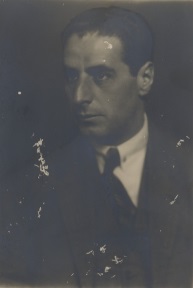
Ernst Toch was an Austrian composer of classical music and film scores. He sought throughout his life to introduce new approaches to music.

Isang Yun, also spelled Yun I-sang, was a Korean-born composer who made his later career in West Germany.

Carl Heinrich Carsten Reinecke was a German composer, conductor, and pianist in the Middle Romantic Era.
Jean René Désiré Françaix was a French neoclassical composer, pianist, and orchestrator, known for his prolific output and vibrant style.
Zurab Nadareishvili was born on January 4, 1957 in Poti, Georgia, where he went to primary and music school. From 1973 to 1978 he studied at the Georgian Polytechnic Institute, after that he resumed music lessons and in 1982 entered Tbilisi State Conservatory, composition class. During the studies at the conservatory he participated in student’s music festivals in Georgia, as well as other countries.
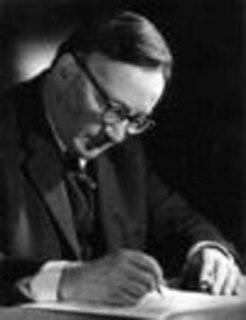
Franz Theodor Reizenstein was a German-born British composer and concert pianist. He left Germany for sanctuary in Britain in 1934 and went on to have his teaching and performing career there. As a composer, he successfully blended the equally strong but very different influences of his primary teachers, Hindemith and Vaughan Williams.
Arnold Atkinson Cooke was a British composer.
Concertino is the diminutive of concerto, thus literally a small or short concerto.
Hermann Schroeder was a German composer and a Catholic church musician.
Jindřich Feld was a Czech composer of classical music.
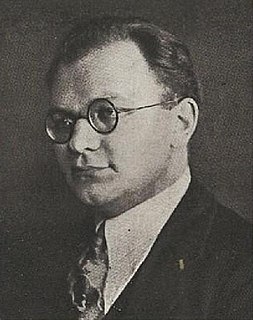
Jaroslav Řídký was a Czech composer, conductor, harpist, and music teacher.
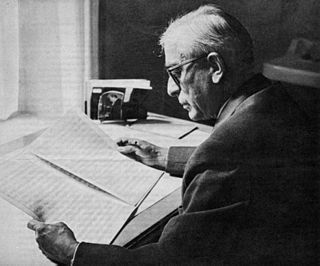
Conrad Arthur Beck was a Swiss composer.
Herman David Koppel, known in Denmark as Herman D. Koppel, was a composer and pianist of Jewish origin. Born in Copenhagen, he fled the Nazis with his family in 1943. He wrote 13 symphonies, numerous concertos, and 20 string quartets.
Niels Finn Høffding was a Danish composer. Høffding studied composition under Knud Jeppesen and Thomas Laub, and then under Joseph Marx in Vienna from 1921-22. His works first became well known in Denmark in the 1920s, particularly the piece Karlsvognen. He began to study folk music about 1930, and founded the Copenhagen School of Folk Music in 1931. From 1931 he also taught at the Royal Danish Academy of Music, where he served as director after 1954. In 1956 and 1958 he was awarded the Nielsen Prize. His pupils include Pelle Gudmundsen-Holmgreen, Vagn Holmboe, Bent Lorentzen, and Leif Thybo. See: List of music students by teacher: G to J#Finn Høffding.
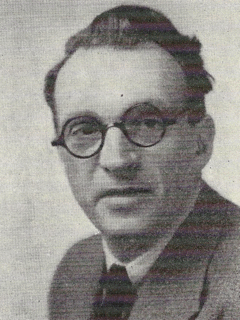
Niels Erling Emmanuel Brene was a Danish composer. He was born and died in Copenhagen. In 1948 he won a bronze medal in the art competitions of the Olympic Games for his orchestral composition Vigeur (Vigour).

Emil Hlobil was a twentieth century Czechoslovakian composer and music professor based in Prague.
Victor Bruns was a German composer and bassoonist. He played with the Leningrad Opera, the Volksoper Berlin and the Staatskapelle Berlin. As a composer, he is known for his ballets and for bassoon concertos and sonatas.
Will Gay Bottje ) was an American composer known for his contributions to electronic music.